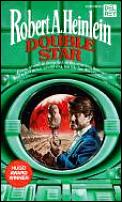
| Publisher: | Del Rey |
| Copyright: | 1956 |
| Printing: | November 1986 |
| ISBN: | 0-345-33013-7 |
| Format: | Mass market |
| Pages: | 243 |
This is probably Heinlein's least-known Hugo winner. It's also his earliest, only the third winner of the best novel Hugo, and belongs to an era of SF that one doesn't see much any more.
Double Star is written in the first person, from the perspective of a down-and-out (but exceptionally, unbelievably talented, not to mention arrogant) actor who is recruited to impersonate an important politician. This isn't a space opera in the standard sense of starships, galactic empires, and daring military adventures, but it is written entirely in the space opera style of the 1940s and 1950s. The plot is, in retrospect, superficial and simple, with suspense coming from the moment-to-moment twists and a strong, unique first-person voice. The good guys are honest, reliable, and honorable; the bad guys (who mostly lurk menacingly off-stage) are brutal, evil, and clearly wrong. There are no shades of grey and never any ambiguity about who to root for.
Also present are many of the early space opera vices, sexism being the most glaring to me. Only two female characters appear in the entire book, only one of which is of any significance whatsoever, and she is such a stereotype (secretary hopelessly in love with her competent, honorable boss) that I cringed every time she appeared. She is, of course, excessively emotional at times and the male lead has to, at one point, take her firmly in hand to get her to snap out of it. I have a little bit of tolerance for this because of when it was written, but not much, and Double Star strained it badly in spots.
It also suffers from many other standard Heinlein problems. Even without much in the way of combat, violence, or war, the book is full of testosterone-laden male posturing, courage and honor (but only manly emotions) in the face of adversity, implausibly capable protagonists, superficial politics, and trivial resolution of any psychological or emotional problems. An actor who can cause people to not recognize him between one moment and the next just by changing his mental attitude and taking on a "role" is a nice bit of fantasy, but hurts suspension of disbelief in an otherwise unfantastic world. One has to just accept that the hero and narrator has uncanny, mutant acting abilities the like of which are never seen in any other man. At least the politics, while superficial, rarely digress into libertarian ranting.
On the other hand, though, Heinlein can write. For what he was trying to do, the story is very well-executed. Events move right along, words flow well from one page to the next, the quirky first-person voice keeps the reader interested, and the plot twists and resolution are satisfying. Even with no depth to the conflict and not much in the way of world-building (the Martians are about the only inventive touch here), Heinlein can tell a good story.
After the sexism and black-and-white morality, I wanted to dislike this book, but the story drew me in anyway. Certainly, Heinlein drops the ball (or rather, never even tries to pick it up) when it comes to exploring the nature of identity, the psychology of impersonation, or the implications of the political situation of the story. These are all disposed of obviously and trivially. He does, though, manage a good yarn and a fun light read.
Not really recommended, but not actually that bad.
Reviewed: 2005-07-26